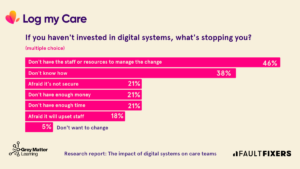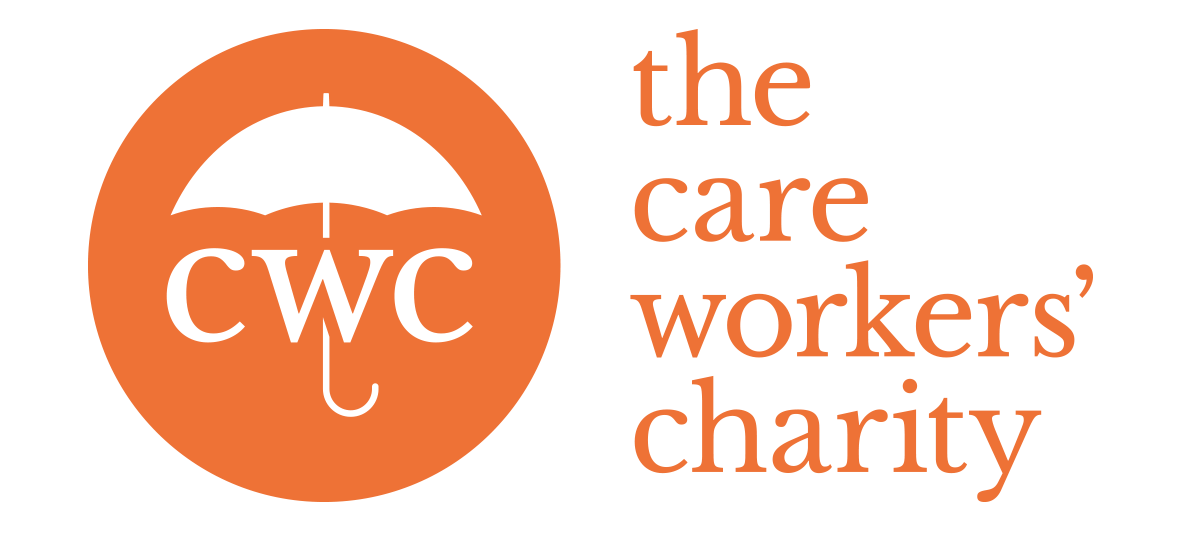 The care sector is experiencing a rapid digital revolution, with a growing emphasis on digitalisation and the adoption of digital tools to elevate care provision. Log my Care teamed up with Grey Matter Learning and FaultFixers to explore the impact of digital systems on care teams. With over 4,000 survey responses from carers, managers, owners and CEOs across social care, the findings shed light on the transformative potential of technology in the care industry.
The care sector is experiencing a rapid digital revolution, with a growing emphasis on digitalisation and the adoption of digital tools to elevate care provision. Log my Care teamed up with Grey Matter Learning and FaultFixers to explore the impact of digital systems on care teams. With over 4,000 survey responses from carers, managers, owners and CEOs across social care, the findings shed light on the transformative potential of technology in the care industry.
The study revealed a promising trend of care providers transitioning towards digital solutions, accompanied by the comfort and readiness of care teams to embrace these changes:
- Care compliance software (46%) and care planning software (46%) emerged as the most widely adopted digital tools in care services, closely followed by e-learning software (30%).
- Moreover, an overwhelming 85% of respondents rated their digital skills as moderate to high, indicating a positive outlook towards digitalisation within the workforce.
Survey results indicated that digital tools have a significant positive impact on productivity, work-life balance, wellbeing and employee recognition among care teams:
- A remarkable 78% of respondents rated their existing digital systems as moderately to highly supportive of remote work, underscoring their role in enabling flexible working arrangements.
- Furthermore, an impressive 85% of participants rated their productivity as 7 or higher on a scale of 10 after embracing digital tools.
- Employee wellbeing experienced a considerable boost as well, with 64% of respondents reporting a positive impact resulting from the implementation of digital tools.
- Consistently across different care types, the adoption of digital tools was perceived as a positive step towards enhancing employee recognition, as reported by 64% of respondents.
- 63% of respondents reported digital systems save their teams up to 30 hours per week.
While digital adoption gains momentum, challenges persist, primarily related to access to devices and sufficient training time. Disparities in hardware provision and training allocation were observed among care providers, leading to variations in employee retention and digital readiness:
- Mobile phones and desktops were the most commonly provided devices for care teams, with nearly 70% of respondents reporting access to these technologies.
- However, care types differed in device provision, with supported living services leading in mobile phone availability and learning disability services lagging behind in device provision.
- Additionally, a mere 7% of respondents reported spending 20 or more hours per month on training, emphasising the urgent need for care services to prioritise staff training to enhance skills, technology adoption and staff retention.
Looking ahead, care providers are prepared to invest in digital tools to further optimise care delivery.
- A majority of respondents (53%) disclosed plans to allocate 5-20% of their care service’s budget to implement new software or digital processes in 2023.
- Care compliance software emerged as the top priority for investment, with 43% of respondents expressing interest, closely followed by care planning software at 40%.
Embracing digital systems gives care providers the opportunity to address the recruitment crisis and empower their teams – by offering a desirable work-life balance and supporting person-centred care delivery, technology can play a pivotal role in creating a sustainable future for the care sector.
Sam Hussain, Founder and CEO at Log my Care says, “I’m thrilled that our research highlights the transformative impact digital systems have on care teams, reinforcing our mission to make technology accessible to everybody in social care.
We believe by embracing digital tools, care providers can enhance productivity, improve employee wellbeing and deliver person-centred care effectively. We remain committed to empowering care teams by providing a user-friendly and beautifully designed platform that streamlines operations and ultimately improves the lives of people receiving care.
This report serves as a powerful testament to the positive changes technology can bring to the care sector and we’re dedicated to continuing to drive digital adoption and innovation in the industry.”
To read the full report, please visit: https://eu1.hubs.ly/H03_Kky0
